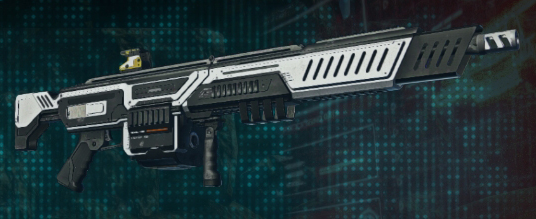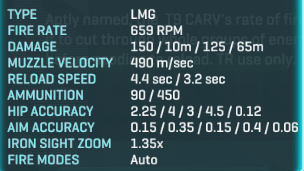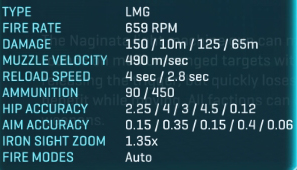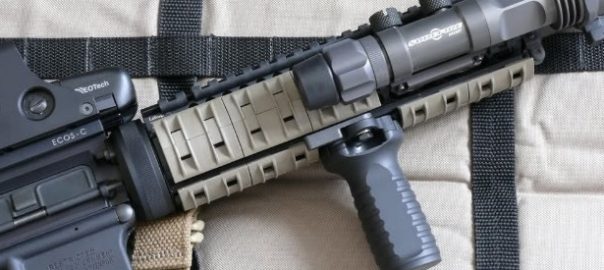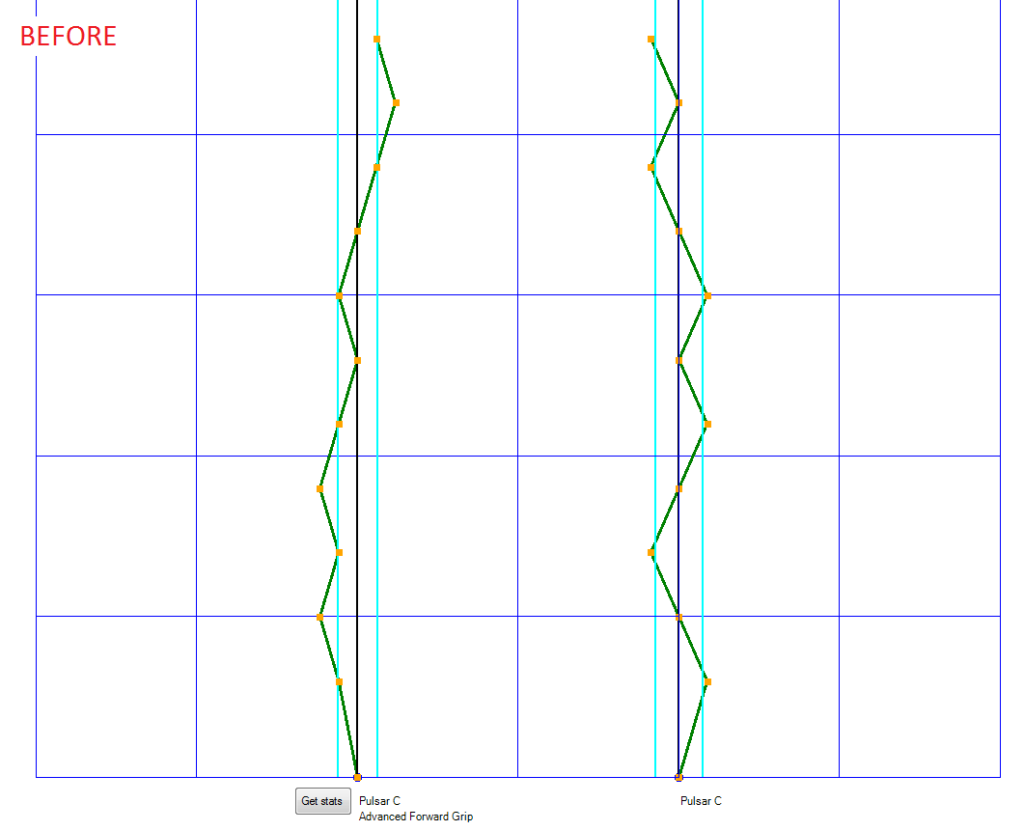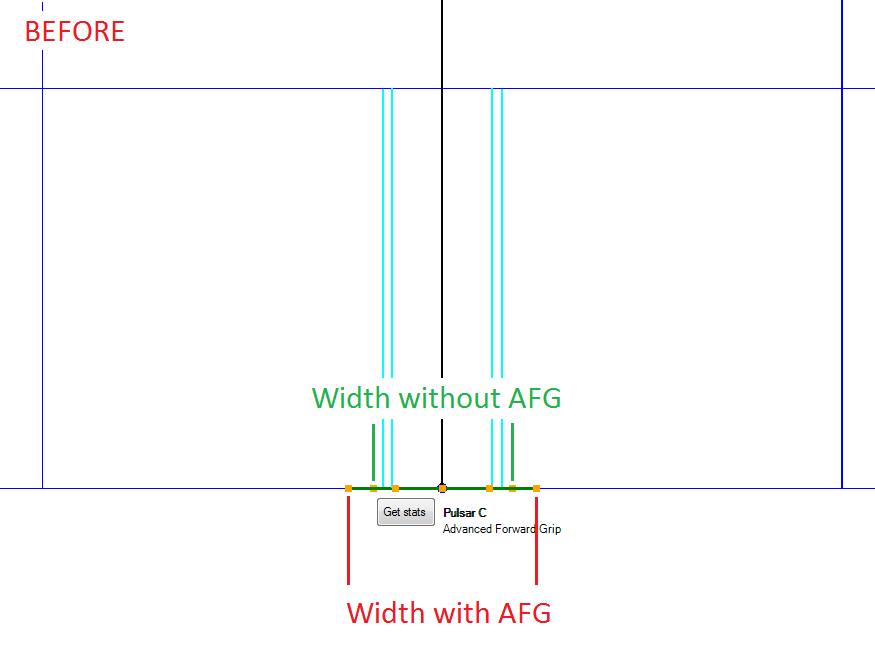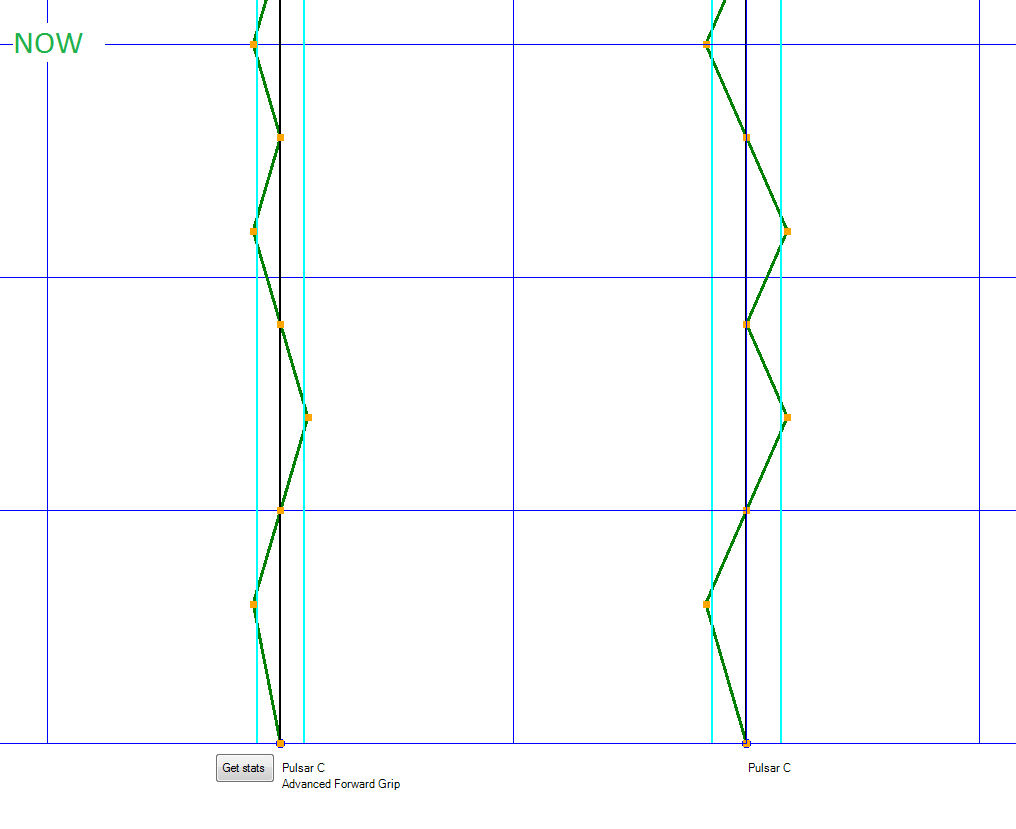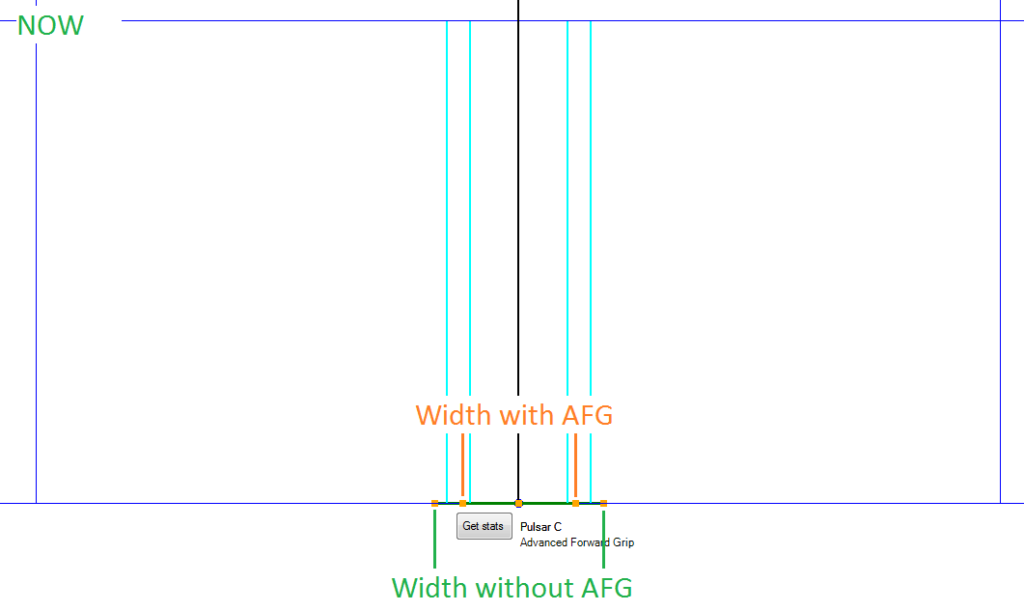Wrel’s video review.
NSX Naginata is a new cross-faction LMG, and the first weapon in upcoming Nanite System Exports lineup of weapons, that are intended to be hard, but rewarding to use, and they will all probably have some sort of a unique mechanical quirk.
In case of NSX Naginata, the quirk is the accuracy of sustained fire, as long as you stand still.
It’s worth noting that Naginata doesn’t share the NS weapon trait of 75% ADS speed. Same as most other LMGs, Naginata has 0.5x ADS Movement Speed multiplier.
Stats
Damage output
Naginata’s maximum bullet damage of 150 and Rate of Fire of 659 are slightly unorthodox, but still very similar to some other LMGs that do 143 damage at 652 RoF.
Naginata deals 1647 DPS within maximum damage range, and 1372 DPS at minimum damage range and further.
This is slightly below average, but comparable to other weapons that rely on accurate shooting.
With 90 rounds per magazine and fast reload, Naginata can just keep firing without much downtime.
Bullets to Kill and Time to Kill
As you would expect, an LMG with just one tier of damage degradation and a relatively high RoF will experience a smooth performance decline as range and enemy defenses increase.
Due to the fact that Naginata’s damage degradation starts at 150, and the closest bullet damage threshold is 143, Naginata’s bullet-to-kill values remain more consistent within 0 – 25m bracket.
Tables below are mostly just for reference.
| Description | Effective Health | Bullets to Kill (Time to Kill, seconds) | ||||
| 7 (0.55) | 8 (0.64) | 9 (0.73) | 10 (0.82) | 11 (0.91) | ||
| Default | 1000 | 0 – 25 | 26+ | |||
| Aux. Shield | 1050 | 0 – 10 | 11 – 51 | 52+ | ||
| Full Nano | 1250 | 0 – 34 | 35+ | |||
| Full Nano + Aux.Shield | 1300 | 0 – 19 | 20 – 51 | 52+ | ||
Naginata has standard Headshot Damage Multiplier of 2x and requires 4 headshots to kill within 51m. Aux. Shield adds an extra headshot at 52m+, but at that kind of range it’s irrelevant.
Heavy Assaults
| Description | Effective Health | Bullets to Kill (Time to Kill, seconds) | |||||
| 10 (0.82) | 11 (0.91) | 12 (1.00) | 13 (1.09) | 14 (1.18) | 15 (1.27) | ||
| NMG | 1437 | 0 – 23 | 24 – 52 | 53+ | |||
| NMG + Aux.Shield | 1487 | 0 – 12 | 13 – 42 | 43+ | |||
| Resist | 1538 | 0 – 32 | 33 – 56 | 57+ | |||
| Resist + Aux.Shield | 1616 | 0 – 16 | 17 – 43 | 44+ | |||
| NMG + Nanoweave | 1796 | 0 – 10 | 11 – 36 | 37 – 57 | 58+ | ||
| NMG + Nano + Aux.Shield | 1858 | 0 – 25 | 26 – 48 | 49+ | |||
Naginata requires 5 – 7 headshots to kill a Heavy Assault, depending on distance and shield type.
Cone of Fire and Bloom
Hip Fire CoFs
Naginata has unremarkable hip fire accuracy. Relatively high RoF adds a bit of consistency, and Naginata will not perform absolutely horribly in a pinch, but you still should try to stay away from hip firing distances, and be careful when storming buildings in first lines.
ADS CoFs
Naginata’s starting ADS CoFs leave a lot to be desired.
Standing moving accuracy of 0.4 is more or less normal for LMGs, especially on those that rely on volume of fire.
But 0.15 stationary starting CoF is comparably bad.
Just a 0.05 degree difference from the common standard of 0.1 is not a big deal, but overall it means Naginata will have trouble reliably hitting far away or small targets even with the first few shots of the burst.
Advanced CoF Mechanics
This is where it gets interesting.
When standing still and aiming down sights, Naginata’s maximum CoF will be much smaller than usual.
Normally, maximum CoF is 3 degrees for ADS and 7 degrees for hip firing.
But Naginata is different:
Maximum ADS CoF while standing still: 0.6
Maximum ADS CoF while crouching still: 0.4
Maximum Hip Fire CoF while standing still: 4.25
In other words, Naginata will only bloom for the first 5 shots while staying still.
As a result, Naginata can provide relatively accurate sustained fire.
But there is another effect.
As you may know from Rule 1 of Advanced CoF Mechanics, if you change stances and your Current CoF is larger than Maximum CoF for your new stance, your Current CoF will reduce to match the Maximum CoF.
So if you fire on the move and bloom your CoF too much, instead of stopping your burst you can stop moving for a moment to “reset” your CoF.
So with Naginata you could use stutter stepping instead of burst firing to boost accuracy on the move. Or even crouch.
Recoil
As pulled from DBG API by planetstats, here are Naginata’s recoil stats:
Vertical Recoil: 0.8
Recoil Angle: -1.5 / 1.5
Horizontal Recoil: 0.16 / 0.16
Horizontal Recoil Tolerance: 0.4 (max 2 bounces in one direction)
First Shot Recoil Multiplier: 1.8x
Recoil Decrease: 13
Naginata has very high vertical recoil, even larger than notorious Gauss SAW, which has Vertical Recoil of 0.55 and fires much slower.
Recoil angle is largely irrelevant and horizontal recoil pattern is very tight.
Recoil Decrease is slightly above average for LMGs, but coupled with very high Vertical Recoil Per Second, burst-firing Naginata can prove challenging.
Battling the vertical recoil is pretty much the main thing you will be doing while using this weapon.
Effective range
Naginata has a carbine-tier Projectile Velocity. 490 m/s is very low for an LMG.
Coupled with below average ADS accuracy, relatively low bullet damage and very high vertical recoil, Naginata will have limited effective range, despite very tight horizontal recoil, and even if you stand still.
Going outside effective range
As long as you can stand still and fire from safe cover, Naginata will remain relatively effective in engaging exposed enemies, even if they are too far for comfort.
Since Naginata can unleash and sustain a large volume of fire, you are bound to kill the enemy, eventually. You will have to compensate for bullet drop and bullet travel time, though.
Attachments
Scope
Due to high vertical recoil and limited effective range, it is better to stick to 1x scopes.
2x should be usable, but unnecessary. If the target is too far away to be comfortably engaged with 1x scope, it is probably outside your effective range anyway.
Rail
The default choice here should be the Forward Grip. While Naginata already has great horizontal recoil by default, it is the only thing limiting your accuracy.
In theory, you can compensate for 100% of the vertical recoil, you have “locked” CoF while standing still, and there is no recoil angle variance.
So using a Forward Grip will increase your maximum potential accuracy.
Extended Mags only increase magazine size by 45 rounds (+50%), while most other LMGs get +100% bonus.
With a very fast reload and risks associated with sustained fire, you are unlikely to need more than 90 rounds at a time, making Ex. Mags not valuable.
Naginata’s LMG-tier hip fire accuracy and increased hip fire bloom make Laser Sight and hip firing in general not very viable.
Barrel
Naginata has access to Flash Suppressor and Compensator.
Both are viable, but in this case Compensator is much more useful.
While one could make an argument that removing muzzle flash would conceal your position and let you stand still and go full auto with more safety, it’s still dangerous and bound to attract attention of enemy snipers.
To avoid being killed too fast, you would want to activate overshield in advance, turning yourself into a big glowing target, and then removing the muzzle flash doesn’t do much.
Compensator will reduce the harsh vertical recoil, which is probably the most valuable effect you could get from an attachment for Naginata.
Ammo
Naginata has access to both SPA and HVA.

Due to unusual maximum damage of 150, Naginata doesn’t suffer an immediate penalty to bullets-to-kill when going outside maximum damage range.
As opposed to some other weapons, where increasing maximum damage range from 10m to 15m is a big deal, it is not for Naginata.
As you can see on the graph, SPA will improve performance in 10m – 30m bracket, while HVA will improve performance in 30m – 85m bracket.
Both offer very small bonuses of up to 1.5% (SPA) and 5.2% (HVA) damage increase in best case scenario. Both are viable, but with Naginata being a relatively close range weapon, SPA will probably be more useful.
Optimal engagement
The ideal engagement for NSX Naginata is somewhat reminiscent of MCG Mini-Chaingun, where you would want to spin it up, and then abuse the static ADS CoF to take out multiple enemies.
The main difference is that NSX Naginata has to be stationary, but actually has accuracy to feasibly kill people at range.
So with NSX Naginata you would want to find a position with good cover and minimal exposure, open only in a small arc in front of you, so you can sit still and fire with relative safety, and mow down exposed enemies as they come by.
Naginata makes a great defensive LMG, or when moving from cover to cover. But you absolutely don’t want to stand still and fire out in the open. Even with overshields, it’s just suicide.
Don’t get stuck on “optimal”!
Don’t get dragged into line of thinking that you need to be always stationary while using Naginata. It is slightly not as good on the move as other LMGs, that’s it. And you can compensate for it with burst firing or stutter stepping.
Most of the time, especially when you’re under fire, you will still want to move while firing.
Only stand still to engage when you have full health and overshield energy, and only behind cover, and preferably when you engage first.
Recommended Heavy Assault Loadout
In order to live up to Naginata’s high uptime, you will need a loadout that leaves you with the least downtime, and makes you tanky at the same time.
The cheapest, easiest to use and the most reliable combination would be Advanced Shield Capacitor with Resist Shield and Med Kits.
With a combo like that, you spend the minimal amount of time recovering in cover, and the most effectively engaging enemy from cover, which is where both the Naginata and Resist Shield thrive the most.
Battle Hardened seems like a good implant to combine with all of that, to give you more potential to outshoot the enemy while tanking their fire.
The rest of the loadout is up to situation and preference.
A minute of sad realism
Naginata is pretty much a heavily nerfed LMG with a ton of vertical recoil and a gimmick that you won’t be able to use in the majority of normal engagements.
Like Phaseshift, it’s a cute little weapon, but alternatives are more reliable and much simpler to use.
If you’re looking for effective, simple, tried and true, you should stay away from Naginata.
If you’re looking for high skill cap / high reward weapon, a weapon that could take months to master, but if mastered would slay legions before you…
… you should still stay away from Naginata.
If you’re a tired and bored veteran and a weapon mechanics nut, if just “killing” enemies heats your blood no longer, and now it’s more about “how” you kill enemies – then Naginata can add color to a few evenings.
Nonetheless, it is a good attempt, and it is very inspiring to see developers bend the borders of conventional weapon mechanics like that, and I look forward to using the Naginata and other upcoming NSX weapons.
The guide is now concluded, feel free to comment or ask questions below.
Adding Naginata into Weapon Simulator
If you want to add NSX Naginata into my Weapon Simulator, add this string to the end of the Stats.csv file, which you can open with Windows Notepad:
804249,NSX Naginata,NS,LMG,150,10,125,65,1,91,1,0.55s / 0.64s / 0.64s,,-,90,450,4000,2800,0.5,0.12,0.06,3,2.25,4.5,5,4,0.15,0.15,0.4,0.35,-1.5,1.5,0.8,0.16,0.16,0.4,1.8,13,Auto,0
Keep in mind that it won’t properly simulate Naginata’s CoF mechanics, but you can still use it to check out TTK at various ranges or compare attachments.
